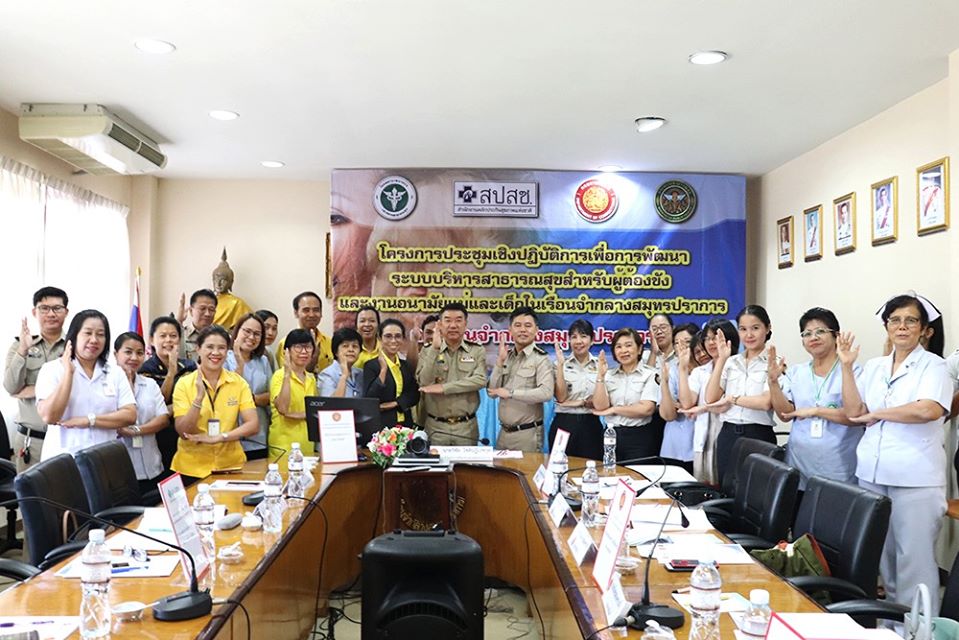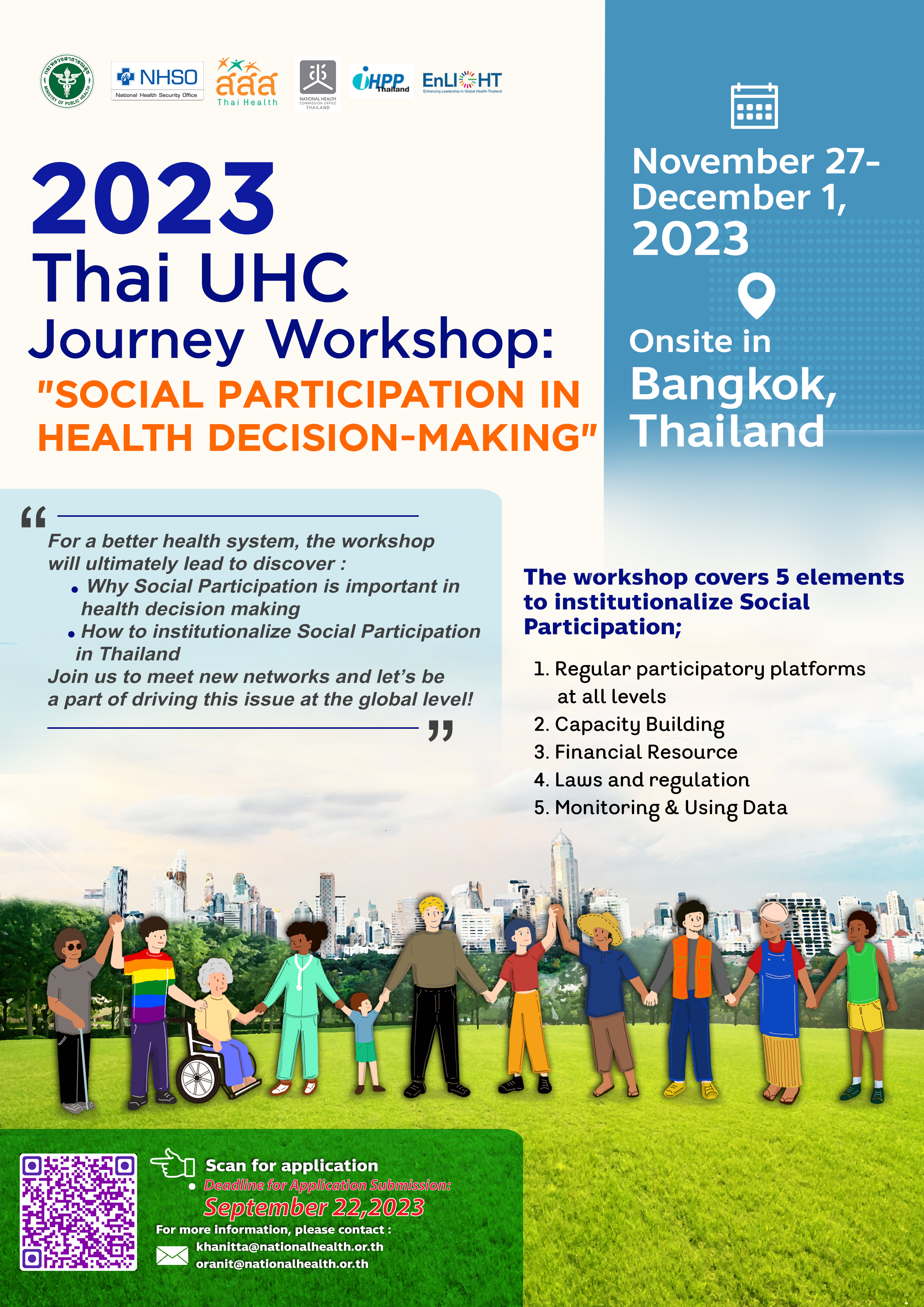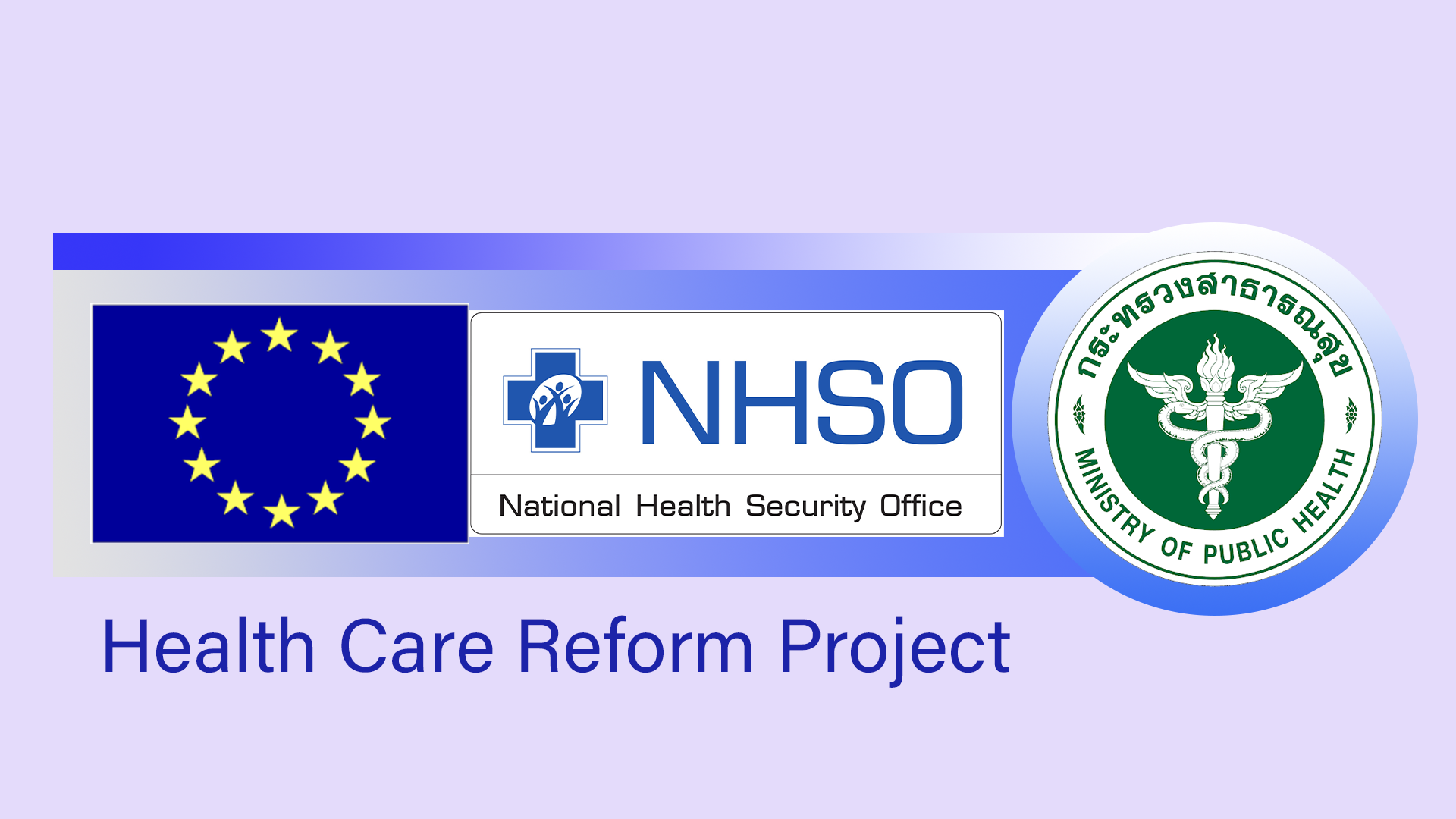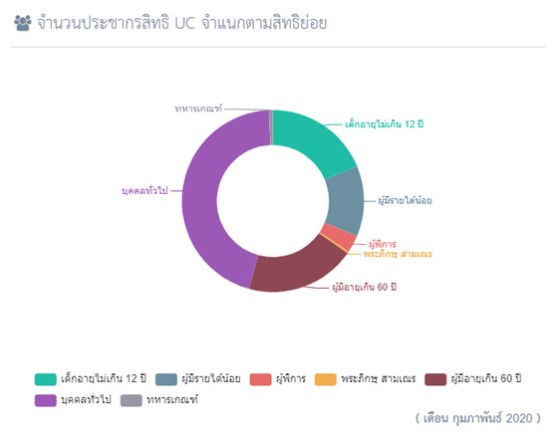Samut Prakan Prison works to improve inmates’ health with royal inspiration
Samut Prakan Prison works to improve inmates’ health with royal inspiration
 The non-discriminatory policy of the universal care coverage scheme dictates that everyone is entitled to equal and thorough health care. However, prison inmates are a vulnerable group of people usually neglected. Nevertheless, they can resume being useful labour for the country after their prison terms.
The non-discriminatory policy of the universal care coverage scheme dictates that everyone is entitled to equal and thorough health care. However, prison inmates are a vulnerable group of people usually neglected. Nevertheless, they can resume being useful labour for the country after their prison terms.
“There have been many problems concerning inmates’ health care,” says Mr. Sithi Sutheewong, Director of Samut Prakan Prison in Samut Prakan. “For example, at Samut Prakan Prison, there are only five nurses who take care of about 7,800 inmates, so one nurse to every 1,500 inmates. Though able to complete day-to-day operations, the medical team cannot work in a proactive way. Moreover, the lack of proper medical instruments worsens the situation.”
“Another serious problem is treatment rights where the prison has to cover inmates’ medical expenses, creating budget and management issues.”
“Initially, Samut Prakan Prison tackled these problems by collaborating with Bangbo Hospital. Doctors from the hospital come to the prison to treat inmates and promote health and disease prevention. Medical equipment was provided and a special area was constructed for inmates who needed referrals to outside hospitals.”
“Later, Samut Prakan Prison worked with the National Health Security Office (NHSO) to more effectively administer healthcare rights and expenses under the universal care coverage scheme. Currently, almost all inmates in Samut Prakan Prison have registered for the healthcare plan.”
A turning point came with the “Corrections Give Happiness and Do Good Deeds with Heart” campaign, an initiative of His Majesty King Maha Vajiralongkorn Phra Vajiraklaochaoyuhua. The project has a clear vision to improve healthcare provision for inmates across the country, provide necessary medical equipment, and develop medical areas in prisons. This empowers all parties involved to work efficiently toward the common goals.
Samut Prakan Prison now has TB screening, is working proactively to prevent specific communicable diseases like HIV and AIDS, and has projects to improve female inmates’ wellbeing according to the Bangkok Rule.
Mr. Kwanchai Santiparapob, Former Director – Inmate Development, Samut Prakan Prison, said that the strength of the prison is its collaboration with network hospitals and local organisations. The programme’s success leads to more partnerships and more budget to promote development. Meanwhile, other prisons come to learn about the operation and start to adopt it.
“The key factor behind the success is that everyone works for the benefit of the inmates,” said Mr. Kwanchai. “We treat them as our citizens and try to work out specific pre-conditions to keep them healthy. Their health is always our main goal.”
 The non-discriminatory policy of the universal care coverage scheme dictates that everyone is entitled to equal and thorough health care. However, prison inmates are a vulnerable group of people usually neglected. Nevertheless, they can resume being useful labour for the country after their prison terms.
The non-discriminatory policy of the universal care coverage scheme dictates that everyone is entitled to equal and thorough health care. However, prison inmates are a vulnerable group of people usually neglected. Nevertheless, they can resume being useful labour for the country after their prison terms.“There have been many problems concerning inmates’ health care,” says Mr. Sithi Sutheewong, Director of Samut Prakan Prison in Samut Prakan. “For example, at Samut Prakan Prison, there are only five nurses who take care of about 7,800 inmates, so one nurse to every 1,500 inmates. Though able to complete day-to-day operations, the medical team cannot work in a proactive way. Moreover, the lack of proper medical instruments worsens the situation.”
“Another serious problem is treatment rights where the prison has to cover inmates’ medical expenses, creating budget and management issues.”
“Initially, Samut Prakan Prison tackled these problems by collaborating with Bangbo Hospital. Doctors from the hospital come to the prison to treat inmates and promote health and disease prevention. Medical equipment was provided and a special area was constructed for inmates who needed referrals to outside hospitals.”
“Later, Samut Prakan Prison worked with the National Health Security Office (NHSO) to more effectively administer healthcare rights and expenses under the universal care coverage scheme. Currently, almost all inmates in Samut Prakan Prison have registered for the healthcare plan.”
A turning point came with the “Corrections Give Happiness and Do Good Deeds with Heart” campaign, an initiative of His Majesty King Maha Vajiralongkorn Phra Vajiraklaochaoyuhua. The project has a clear vision to improve healthcare provision for inmates across the country, provide necessary medical equipment, and develop medical areas in prisons. This empowers all parties involved to work efficiently toward the common goals.
Samut Prakan Prison now has TB screening, is working proactively to prevent specific communicable diseases like HIV and AIDS, and has projects to improve female inmates’ wellbeing according to the Bangkok Rule.
Mr. Kwanchai Santiparapob, Former Director – Inmate Development, Samut Prakan Prison, said that the strength of the prison is its collaboration with network hospitals and local organisations. The programme’s success leads to more partnerships and more budget to promote development. Meanwhile, other prisons come to learn about the operation and start to adopt it.
“The key factor behind the success is that everyone works for the benefit of the inmates,” said Mr. Kwanchai. “We treat them as our citizens and try to work out specific pre-conditions to keep them healthy. Their health is always our main goal.”
IN DEPTH
Samut Prakan Prison works to improve inmates’ health with royal inspiration
Samut Prakan Prison works to improve inmates’ health with royal inspiration
 The non-discriminatory policy of the universal care coverage scheme dictates that everyone is entitled to equal and thorough health care. However, prison inmates are a vulnerable group of people usually neglected. Nevertheless, they can resume being useful labour for the country after their prison terms.
The non-discriminatory policy of the universal care coverage scheme dictates that everyone is entitled to equal and thorough health care. However, prison inmates are a vulnerable group of people usually neglected. Nevertheless, they can resume being useful labour for the country after their prison terms.
“There have been many problems concerning inmates’ health care,” says Mr. Sithi Sutheewong, Director of Samut Prakan Prison in Samut Prakan. “For example, at Samut Prakan Prison, there are only five nurses who take care of about 7,800 inmates, so one nurse to every 1,500 inmates. Though able to complete day-to-day operations, the medical team cannot work in a proactive way. Moreover, the lack of proper medical instruments worsens the situation.”
“Another serious problem is treatment rights where the prison has to cover inmates’ medical expenses, creating budget and management issues.”
“Initially, Samut Prakan Prison tackled these problems by collaborating with Bangbo Hospital. Doctors from the hospital come to the prison to treat inmates and promote health and disease prevention. Medical equipment was provided and a special area was constructed for inmates who needed referrals to outside hospitals.”
“Later, Samut Prakan Prison worked with the National Health Security Office (NHSO) to more effectively administer healthcare rights and expenses under the universal care coverage scheme. Currently, almost all inmates in Samut Prakan Prison have registered for the healthcare plan.”
A turning point came with the “Corrections Give Happiness and Do Good Deeds with Heart” campaign, an initiative of His Majesty King Maha Vajiralongkorn Phra Vajiraklaochaoyuhua. The project has a clear vision to improve healthcare provision for inmates across the country, provide necessary medical equipment, and develop medical areas in prisons. This empowers all parties involved to work efficiently toward the common goals.
Samut Prakan Prison now has TB screening, is working proactively to prevent specific communicable diseases like HIV and AIDS, and has projects to improve female inmates’ wellbeing according to the Bangkok Rule.
Mr. Kwanchai Santiparapob, Former Director – Inmate Development, Samut Prakan Prison, said that the strength of the prison is its collaboration with network hospitals and local organisations. The programme’s success leads to more partnerships and more budget to promote development. Meanwhile, other prisons come to learn about the operation and start to adopt it.
“The key factor behind the success is that everyone works for the benefit of the inmates,” said Mr. Kwanchai. “We treat them as our citizens and try to work out specific pre-conditions to keep them healthy. Their health is always our main goal.”
 The non-discriminatory policy of the universal care coverage scheme dictates that everyone is entitled to equal and thorough health care. However, prison inmates are a vulnerable group of people usually neglected. Nevertheless, they can resume being useful labour for the country after their prison terms.
The non-discriminatory policy of the universal care coverage scheme dictates that everyone is entitled to equal and thorough health care. However, prison inmates are a vulnerable group of people usually neglected. Nevertheless, they can resume being useful labour for the country after their prison terms.“There have been many problems concerning inmates’ health care,” says Mr. Sithi Sutheewong, Director of Samut Prakan Prison in Samut Prakan. “For example, at Samut Prakan Prison, there are only five nurses who take care of about 7,800 inmates, so one nurse to every 1,500 inmates. Though able to complete day-to-day operations, the medical team cannot work in a proactive way. Moreover, the lack of proper medical instruments worsens the situation.”
“Another serious problem is treatment rights where the prison has to cover inmates’ medical expenses, creating budget and management issues.”
“Initially, Samut Prakan Prison tackled these problems by collaborating with Bangbo Hospital. Doctors from the hospital come to the prison to treat inmates and promote health and disease prevention. Medical equipment was provided and a special area was constructed for inmates who needed referrals to outside hospitals.”
“Later, Samut Prakan Prison worked with the National Health Security Office (NHSO) to more effectively administer healthcare rights and expenses under the universal care coverage scheme. Currently, almost all inmates in Samut Prakan Prison have registered for the healthcare plan.”
A turning point came with the “Corrections Give Happiness and Do Good Deeds with Heart” campaign, an initiative of His Majesty King Maha Vajiralongkorn Phra Vajiraklaochaoyuhua. The project has a clear vision to improve healthcare provision for inmates across the country, provide necessary medical equipment, and develop medical areas in prisons. This empowers all parties involved to work efficiently toward the common goals.
Samut Prakan Prison now has TB screening, is working proactively to prevent specific communicable diseases like HIV and AIDS, and has projects to improve female inmates’ wellbeing according to the Bangkok Rule.
Mr. Kwanchai Santiparapob, Former Director – Inmate Development, Samut Prakan Prison, said that the strength of the prison is its collaboration with network hospitals and local organisations. The programme’s success leads to more partnerships and more budget to promote development. Meanwhile, other prisons come to learn about the operation and start to adopt it.
“The key factor behind the success is that everyone works for the benefit of the inmates,” said Mr. Kwanchai. “We treat them as our citizens and try to work out specific pre-conditions to keep them healthy. Their health is always our main goal.”
Events
Samut Prakan Prison works to improve inmates’ health with royal inspiration
Samut Prakan Prison works to improve inmates’ health with royal inspiration
 The non-discriminatory policy of the universal care coverage scheme dictates that everyone is entitled to equal and thorough health care. However, prison inmates are a vulnerable group of people usually neglected. Nevertheless, they can resume being useful labour for the country after their prison terms.
The non-discriminatory policy of the universal care coverage scheme dictates that everyone is entitled to equal and thorough health care. However, prison inmates are a vulnerable group of people usually neglected. Nevertheless, they can resume being useful labour for the country after their prison terms.
“There have been many problems concerning inmates’ health care,” says Mr. Sithi Sutheewong, Director of Samut Prakan Prison in Samut Prakan. “For example, at Samut Prakan Prison, there are only five nurses who take care of about 7,800 inmates, so one nurse to every 1,500 inmates. Though able to complete day-to-day operations, the medical team cannot work in a proactive way. Moreover, the lack of proper medical instruments worsens the situation.”
“Another serious problem is treatment rights where the prison has to cover inmates’ medical expenses, creating budget and management issues.”
“Initially, Samut Prakan Prison tackled these problems by collaborating with Bangbo Hospital. Doctors from the hospital come to the prison to treat inmates and promote health and disease prevention. Medical equipment was provided and a special area was constructed for inmates who needed referrals to outside hospitals.”
“Later, Samut Prakan Prison worked with the National Health Security Office (NHSO) to more effectively administer healthcare rights and expenses under the universal care coverage scheme. Currently, almost all inmates in Samut Prakan Prison have registered for the healthcare plan.”
A turning point came with the “Corrections Give Happiness and Do Good Deeds with Heart” campaign, an initiative of His Majesty King Maha Vajiralongkorn Phra Vajiraklaochaoyuhua. The project has a clear vision to improve healthcare provision for inmates across the country, provide necessary medical equipment, and develop medical areas in prisons. This empowers all parties involved to work efficiently toward the common goals.
Samut Prakan Prison now has TB screening, is working proactively to prevent specific communicable diseases like HIV and AIDS, and has projects to improve female inmates’ wellbeing according to the Bangkok Rule.
Mr. Kwanchai Santiparapob, Former Director – Inmate Development, Samut Prakan Prison, said that the strength of the prison is its collaboration with network hospitals and local organisations. The programme’s success leads to more partnerships and more budget to promote development. Meanwhile, other prisons come to learn about the operation and start to adopt it.
“The key factor behind the success is that everyone works for the benefit of the inmates,” said Mr. Kwanchai. “We treat them as our citizens and try to work out specific pre-conditions to keep them healthy. Their health is always our main goal.”
 The non-discriminatory policy of the universal care coverage scheme dictates that everyone is entitled to equal and thorough health care. However, prison inmates are a vulnerable group of people usually neglected. Nevertheless, they can resume being useful labour for the country after their prison terms.
The non-discriminatory policy of the universal care coverage scheme dictates that everyone is entitled to equal and thorough health care. However, prison inmates are a vulnerable group of people usually neglected. Nevertheless, they can resume being useful labour for the country after their prison terms.“There have been many problems concerning inmates’ health care,” says Mr. Sithi Sutheewong, Director of Samut Prakan Prison in Samut Prakan. “For example, at Samut Prakan Prison, there are only five nurses who take care of about 7,800 inmates, so one nurse to every 1,500 inmates. Though able to complete day-to-day operations, the medical team cannot work in a proactive way. Moreover, the lack of proper medical instruments worsens the situation.”
“Another serious problem is treatment rights where the prison has to cover inmates’ medical expenses, creating budget and management issues.”
“Initially, Samut Prakan Prison tackled these problems by collaborating with Bangbo Hospital. Doctors from the hospital come to the prison to treat inmates and promote health and disease prevention. Medical equipment was provided and a special area was constructed for inmates who needed referrals to outside hospitals.”
“Later, Samut Prakan Prison worked with the National Health Security Office (NHSO) to more effectively administer healthcare rights and expenses under the universal care coverage scheme. Currently, almost all inmates in Samut Prakan Prison have registered for the healthcare plan.”
A turning point came with the “Corrections Give Happiness and Do Good Deeds with Heart” campaign, an initiative of His Majesty King Maha Vajiralongkorn Phra Vajiraklaochaoyuhua. The project has a clear vision to improve healthcare provision for inmates across the country, provide necessary medical equipment, and develop medical areas in prisons. This empowers all parties involved to work efficiently toward the common goals.
Samut Prakan Prison now has TB screening, is working proactively to prevent specific communicable diseases like HIV and AIDS, and has projects to improve female inmates’ wellbeing according to the Bangkok Rule.
Mr. Kwanchai Santiparapob, Former Director – Inmate Development, Samut Prakan Prison, said that the strength of the prison is its collaboration with network hospitals and local organisations. The programme’s success leads to more partnerships and more budget to promote development. Meanwhile, other prisons come to learn about the operation and start to adopt it.
“The key factor behind the success is that everyone works for the benefit of the inmates,” said Mr. Kwanchai. “We treat them as our citizens and try to work out specific pre-conditions to keep them healthy. Their health is always our main goal.”
RESOURCE CENTER
SECRETARY-GENERAL
Samut Prakan Prison works to improve inmates’ health with royal inspiration
Samut Prakan Prison works to improve inmates’ health with royal inspiration
 The non-discriminatory policy of the universal care coverage scheme dictates that everyone is entitled to equal and thorough health care. However, prison inmates are a vulnerable group of people usually neglected. Nevertheless, they can resume being useful labour for the country after their prison terms.
The non-discriminatory policy of the universal care coverage scheme dictates that everyone is entitled to equal and thorough health care. However, prison inmates are a vulnerable group of people usually neglected. Nevertheless, they can resume being useful labour for the country after their prison terms.
“There have been many problems concerning inmates’ health care,” says Mr. Sithi Sutheewong, Director of Samut Prakan Prison in Samut Prakan. “For example, at Samut Prakan Prison, there are only five nurses who take care of about 7,800 inmates, so one nurse to every 1,500 inmates. Though able to complete day-to-day operations, the medical team cannot work in a proactive way. Moreover, the lack of proper medical instruments worsens the situation.”
“Another serious problem is treatment rights where the prison has to cover inmates’ medical expenses, creating budget and management issues.”
“Initially, Samut Prakan Prison tackled these problems by collaborating with Bangbo Hospital. Doctors from the hospital come to the prison to treat inmates and promote health and disease prevention. Medical equipment was provided and a special area was constructed for inmates who needed referrals to outside hospitals.”
“Later, Samut Prakan Prison worked with the National Health Security Office (NHSO) to more effectively administer healthcare rights and expenses under the universal care coverage scheme. Currently, almost all inmates in Samut Prakan Prison have registered for the healthcare plan.”
A turning point came with the “Corrections Give Happiness and Do Good Deeds with Heart” campaign, an initiative of His Majesty King Maha Vajiralongkorn Phra Vajiraklaochaoyuhua. The project has a clear vision to improve healthcare provision for inmates across the country, provide necessary medical equipment, and develop medical areas in prisons. This empowers all parties involved to work efficiently toward the common goals.
Samut Prakan Prison now has TB screening, is working proactively to prevent specific communicable diseases like HIV and AIDS, and has projects to improve female inmates’ wellbeing according to the Bangkok Rule.
Mr. Kwanchai Santiparapob, Former Director – Inmate Development, Samut Prakan Prison, said that the strength of the prison is its collaboration with network hospitals and local organisations. The programme’s success leads to more partnerships and more budget to promote development. Meanwhile, other prisons come to learn about the operation and start to adopt it.
“The key factor behind the success is that everyone works for the benefit of the inmates,” said Mr. Kwanchai. “We treat them as our citizens and try to work out specific pre-conditions to keep them healthy. Their health is always our main goal.”
 The non-discriminatory policy of the universal care coverage scheme dictates that everyone is entitled to equal and thorough health care. However, prison inmates are a vulnerable group of people usually neglected. Nevertheless, they can resume being useful labour for the country after their prison terms.
The non-discriminatory policy of the universal care coverage scheme dictates that everyone is entitled to equal and thorough health care. However, prison inmates are a vulnerable group of people usually neglected. Nevertheless, they can resume being useful labour for the country after their prison terms.“There have been many problems concerning inmates’ health care,” says Mr. Sithi Sutheewong, Director of Samut Prakan Prison in Samut Prakan. “For example, at Samut Prakan Prison, there are only five nurses who take care of about 7,800 inmates, so one nurse to every 1,500 inmates. Though able to complete day-to-day operations, the medical team cannot work in a proactive way. Moreover, the lack of proper medical instruments worsens the situation.”
“Another serious problem is treatment rights where the prison has to cover inmates’ medical expenses, creating budget and management issues.”
“Initially, Samut Prakan Prison tackled these problems by collaborating with Bangbo Hospital. Doctors from the hospital come to the prison to treat inmates and promote health and disease prevention. Medical equipment was provided and a special area was constructed for inmates who needed referrals to outside hospitals.”
“Later, Samut Prakan Prison worked with the National Health Security Office (NHSO) to more effectively administer healthcare rights and expenses under the universal care coverage scheme. Currently, almost all inmates in Samut Prakan Prison have registered for the healthcare plan.”
A turning point came with the “Corrections Give Happiness and Do Good Deeds with Heart” campaign, an initiative of His Majesty King Maha Vajiralongkorn Phra Vajiraklaochaoyuhua. The project has a clear vision to improve healthcare provision for inmates across the country, provide necessary medical equipment, and develop medical areas in prisons. This empowers all parties involved to work efficiently toward the common goals.
Samut Prakan Prison now has TB screening, is working proactively to prevent specific communicable diseases like HIV and AIDS, and has projects to improve female inmates’ wellbeing according to the Bangkok Rule.
Mr. Kwanchai Santiparapob, Former Director – Inmate Development, Samut Prakan Prison, said that the strength of the prison is its collaboration with network hospitals and local organisations. The programme’s success leads to more partnerships and more budget to promote development. Meanwhile, other prisons come to learn about the operation and start to adopt it.
“The key factor behind the success is that everyone works for the benefit of the inmates,” said Mr. Kwanchai. “We treat them as our citizens and try to work out specific pre-conditions to keep them healthy. Their health is always our main goal.”
VIDEOS
Thailand's UHC Journey
UHC Public relations























